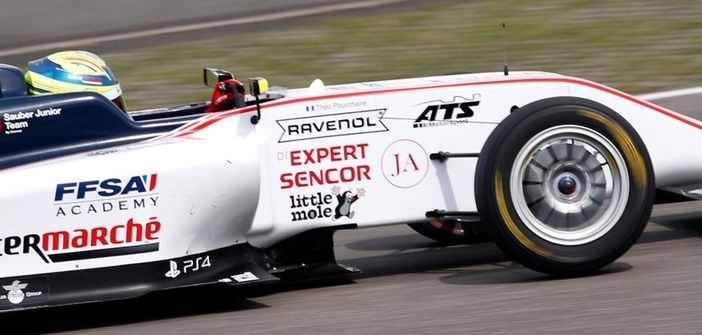Originally from Grasse, Théo Pourchaire, a young 16-year-old racing driver, competes in Formula 3 with the ART Grand Prix team. On the eve of a busy weekend in Austria, he gave us an interview.
How did this passion for car racing come to you?
It comes from my father who loved this field and did a lot of it as a hobby. He instilled this passion in me and got me started very young, at the age of three, in a karting club.
What are the different steps to access the top level, to Formula 1?
The first step to progress in motorsport is regular and intense practice of karting from a young age. You need to participate in competitions, regional at first, then national. As you grow older and gain experience, you move up in category to access the European and world championships based on age. Then, if you have the level, getting into Formula 4 is possible. For my part, I entered French Formula 4 at 14 years old, which is the only single-seater championship you can participate in at that age. Last year I joined the German F4 with the title of champion at the end. I then entered the Formula 3 world championships this year, at 16 (the minimum required age). From there, anything is possible.
This year, with the Formula 3 world championships, what are your ambitions?
Like every year, I aim for victory. I know it’s not going to be easy, I am 16 years old, and I am the youngest driver engaged. The average age is 19, with some being 25 years old. I still have a lot to learn, but my main goal remains victory. I will do everything to win this year.
With the Covid-19 crisis, the halt of national and international competitions, and the several weeks of confinement imposed by France, how did you manage this period, especially in terms of your preparation?
This period was quite complicated for me. In Formula 3, we don’t get much track time, and I was penalized as a young driver. During this slow period, it was necessary to compensate with physical training or simulation. But it did not reproduce the driving sensations at all. However, I was able to spend more time with my family because it’s a sport where we travel a lot, so we are not often at home.
Is being a high-level driver about a lot of sacrifices?
Yes, it is a tough sport. In addition to being away from family and friends, being a driver also means many sacrifices in terms of school. I had to pursue my studies at the school of the French motorsport federation. Even though I am taking my bac next year, I study less than other people my age. I avoid going out, and my social life is affected. It is indeed a lot of sacrifices, but I love it, and I want to live for it.
How does a race week unfold?
With the team, we arrive on Wednesday at the race location. On Thursday, we do preparation laps on foot with the engineers, where we prepare for the next day’s track runs. On Friday, we proceed with free practice followed by qualifying. Two races are scheduled over the weekend, one on Saturday and the other on Sunday. The starting grid for the first race is determined by the qualifying results from the previous day. For Sunday, the grid is reversed based on the top 10 from race number 1. The 10th starts first, and so on. The aim is to offer more spectacle and opportunities for drivers to stand out. The winner of Saturday’s race earns 25 points, while the Sunday winner earns 15.
For this second weekend in Austria, what are your ambitions?
After two mixed races last week, I aim for the top 10, or even the podium, this weekend. My car (ART Grand Prix) has the potential to achieve a top 3. My teammate even achieved pole position last weekend. I am going to aim to win every race.
To follow Théo Pourchaire this weekend, here’s the TV program:
- Friday at 1:55 PM: F3 qualifications on Canal+ Sport
- Saturday at 10:20 AM: race 1 on Canal+ Sport
- Sunday at 9:40 AM: race 2 on Canal+


